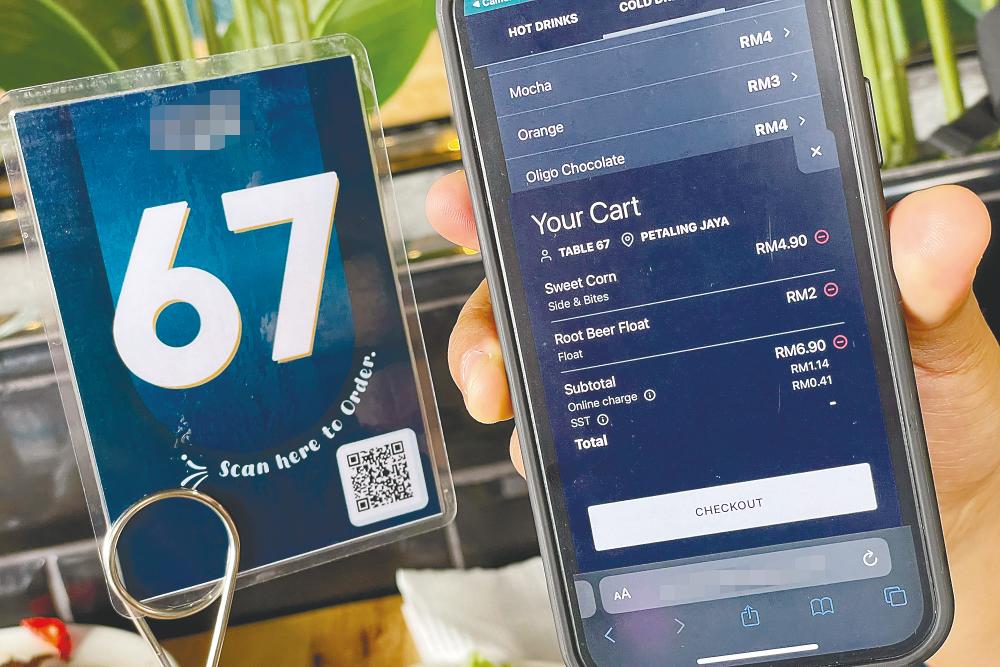PETALING JAYA: The Malaysian Muslim Consumer Association has urged the Domestic Trade and Cost of Living Ministry to act against restaurants that charge customers to use their online platforms, especially when the fees are not disclosed beforehand.
Its president Datuk Nadzim Johan said no undisclosed additional charges can be imposed on customers, especially since a 10% service charge is already applied.
“Businesses cannot legally impose additional charges that aren’t disclosed beforehand and customers shouldn’t have to pay either. The ministry should investigate and take action against businesses that implement such practices. Otherwise, customers will be cheated,” he said.
Nadzim was commenting on a check by theSun that found a restaurant was imposing a fee for using its QR code system when paying through its online gateway. The charge varies depending on the total bill.
The restaurant also did not display notices to inform customers about the extra online platform fee or inform them verbally about it.
Nadzim said restaurants cannot impose charges on their customers at will, regardless of the amount.
Doing so is illegal and unethical since it undermines the trust between the restaurant and its customers.
“Consumers must know their rights to avoid being unfairly charged. Restaurants need to communicate such charges through visible notices or signage. Otherwise, it is tantamount to profiteering.
“For example, if one customer is charged RM1 and 100 customers are affected, that results in RM100 of additional profit for the restaurant.”
Nadzim said if the restaurant is using the QR code system for its convenience, it should bear the cost itself and not pass the expense to the customer.
Lawyer Muhamad Akmal Arif Shamsul Kahar said charging additional fees to use the online platform without clearly communicating the matter is an unfair trade practice under Malaysian consumer protection laws.
“Under the Trade Description Act 2011, which regulates false and misleading information about goods, services and pricing, failing to disclose additional charges is a violation, especially if customers were not informed of it earlier.”
Muhammad Akmal said based on the receipt issued by the restaurant, the “online charges” are attributed to “additional charges for payment gateway and platform fees”.
He said a payment gateway is an online service that approves payments for e-commerce transactions, allowing customers to pay with credit or debit cards and merchants to receive funds quickly.
However, he said the costs for using payment gateways vary and the charges depend on which one the restaurant uses.
“It is also important to note that some agreements between the restaurant owner and payment gateways may have specific rules about passing transaction fees on to customers.
“However, regardless of these agreements, full disclosure of any such fees to customers is still required.”
Muhamad Akmal said under the Price Control and Anti-Profiteering Act 2011 (PCAP), failure to ensure any price changes or additional fees are communicated could lead to penalties.
“According to Section 18 of PCAP, if additional charges are not disclosed transparently, the business could face fines or other penalties not exceeding RM500,000.
“If an individual who is not a corporate body committed the offence, he could be fined not exceeding RM100,000 or be jailed not more than three years or both,” he said.
Muhammad Akmal advised the restaurant’s customers to obtain a refund by filing complaints with the Consumer Protection Tribunal.
“Consumers should also complain to the ministry to investigate the matter. If the restaurant is found to have engaged in unfair practices, the tribunal will order it to provide refunds or other remedies,” he said.
theSun reached out to the restaurant for comments four days ago but has yet to receive its comments.









